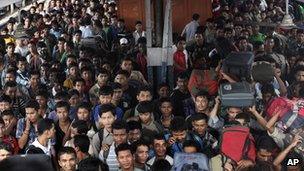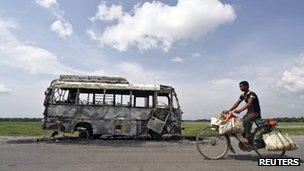How the Assam conflict creates a threat to all India
- Published
Hundreds of thousands of Muslims are marking the festival of Eid inside heavily guarded relief camps in Assam
More than 300,000 refugees are in relief camps in India's north-eastern Assam state after recent clashes between indigenous tribals and Muslim settlers. And migrants from the north-east have fled other Indian cities fearing reprisal attacks. The BBC's Sanjoy Majumder reports from Assam, where the unrest began.
In an open field next to a railway track in Basugaon, Assam, several hundred Muslims kneel in prayer to mark the end of Ramadan and the festival of Eid.
This should have been a time for celebration. But many of the worshippers are visibly upset, some are crying.
The cleric raises his hands and prays for peace - for Assam and for India. Some in the congregation break down completely, their eyes streaming.
"What is there to celebrate?" asks Zia Ali Sheikh. "We have nothing left, nothing to give our children."
Desperate conditions
These Bengali-speaking Muslims were forced out of their villages after an attack by the indigenous, predominantly Hindu Bodo tribe.
They are now staying in a temporary camp at the local school, in desperate conditions.
"Do you think I want to live here?" asks Zubina Bibi. "There's no proper food, we get wet in the rain. But where am I supposed to go?"

Trains carrying thousands of north-east Indian migrants have been arriving in Assam
The refugees tell me that the authorities are asking them to go back home. But they have refused until they are assured of their safety.
A short drive brings me to Naorbitta village and it's immediately clear why the refugees are so insecure.
This was a thriving community, with 115 Muslim families. Now, all that remains of their homes are burnt out walls and rubble.
Inside one of the houses, there's a sense of a life that was suddenly, cruelly uprooted. A child's schoolbook, a shoe, toys and burnt clothes strewn amid the debris.
And just across the road, barely 50 metres away, are the homes of their Bodo neighbours, completely unscathed.
Ranjit Biswamutiary lives in one of the houses and tells me that an armed group attacked the homes one night and drove the Muslims away.
"It's sad because we've always lived in peace. But after all this trouble, I don't want them back."
Helpless
The Bodos and Muslims have always lived together but this brutal cycle of violence has caused a rift which many believe may be irreversible. And neither side is holding back.
The Gambaribil relief camp is a mirror image of the one at Basugaon, except its inmates are Bodos.
This too has been set up in a school, although it's visibly cleaner and better equipped. Volunteers distribute clothes and medicines and the food is much better - soya bean and bubbling pots of lentils and rice.
But the stories are equally horrifying.

Most of Assam's Muslims have lived in the area for generations
"My home is surrounded by Muslim houses," says Ronen Brahma.
"They attacked us one night with swords and knives."
He was able to get away with his mother. But his elderly father was trapped. Ronen could only watch helplessly as his father was stabbed and then tossed into the burning house.
The Bodos accuse the Muslims of being illegal migrants from Bangladesh, which is just south of here.
But political analyst Nilim Dutta says most of Assam's Muslims have lived here for generations.
"They first migrated here in the 19th century from Bengal when this was all part of colonial India.
"Over time, the Bengali migrants prospered, just like immigrant communities all over the world. This created a sense of resentment among the native Assamese communities as they both competed for resources and jobs."
Now the impact of this conflict is being felt right across India.
Trains carrying thousands of north-east Indian migrants have been arriving in Assam.
They're fleeing from some of India's biggest and riches cities amid rumours of attacks by Muslims in retaliation for the Assam violence.
"I was told that there were mobile phone text messages warning us to leave," said one young man who works as a security guard in Bangalore.
"My parents were so frightened after seeing all the television reports that they asked me to come back," says another.
But most of them say they will go back, eventually.
It's a sentiment that the Indian government hopes will be widely shared and help ease tensions.
A conflict once confined to a remote part of India has spread well beyond - partly because this is an age where information is easily and rapidly available.
If the violence goes unchecked, it could well threaten India's pluralism.
- Published26 July 2012
- Published24 July 2012